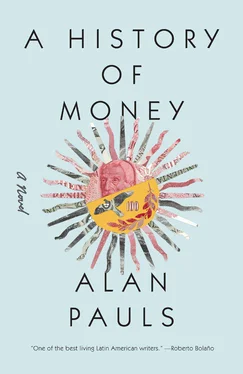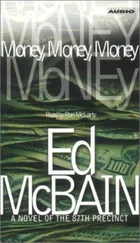He answers, of course. He answers like the good slave he is to the only real job he’s ever had, a job nobody offered or assigned to him, which nobody hired him for and in which he never has to answer to anyone, a job he’s born with and will die with: taking responsibility for the meaning of things. But he can’t stand these people. He’d desert them, leave, slamming the door behind him so that it shook and possibly cracked the beautiful crystalware the disabled bunch keep unused in heavy, dark-wood dressers that are always threatening to collapse, which they somehow managed to bring from Europe in one piece, the same wild Europe that slaughters all of their relatives, or fills them with lead, or gases them — he’d desert them if he weren’t suddenly distracted by the new member of the group, a tall, thin man with an aquiline profile who’s as stern as an undertaker and has a vague record of militancy (he’s rumored to have provided printing machinery to the Montoneros), who spent six years in exile in Brazil, where he first heard and uttered the word reciclaje, selling out, and then came back and made a fortune, initially importing blank videotapes, then later manufacturing them in a remote Patagonian plant, until he retired and used his remaining stock of tapes to start a small distributor of art-house films called La Tierra Tiembla, whose titles — Soviet avant-garde, Italian neorealism, German expressionism, Jancsó, Wajda, Jackal of Nahueltoro —are listed in alphabetical order in a brochure the accountant slips into his pocket one night, all of them at his disposal for the group’s meetings, all he has to do is ask. The other members of the disabled bunch call him the King, an innocuous abbreviation of the King of Magnetic Tape (but the King, being modest and antimonarchical, must never find out). Whatever his powers might be, the King doesn’t contain the epidemic; quite the opposite, in fact. The what-does-it-means gain force. Maybe the element of novelty he adds to the group makes the desire to participate and to know even stronger; maybe the fact that the films they’re now watching and discussing come from within the group gives them more of a right to make themselves heard. Chaplin: what does it mean. Ashes and Diamonds : what does it mean. Stalker : what the hell does it mean! One more and he’ll explode. He really will leave this time. He’ll take the money for the last session and never see them again. But now it’s Ivan the Terrible —one of La Tierra Tiembla’s star titles, along with La tierra tiembla —and if he left before that, as he intends to, he’d miss the best thing of all. He’d miss the King of Magnetic Tape’s lesson.
A rainy Friday. A spacious, comfortable apartment in a prosperous, though not opulent, neighborhood. Waterproof jackets and umbrellas dripping penitently in a half bathroom. Steam rises from cups of coffee and tea and smoke from the King’s Cuban cigar while he gazes at the screen wearing a broad smile of satisfaction, just like he does every time they watch a film from his list. As teacher, he stands guard near the machine, his leg trembling with impatience. He has the remote control in his hand, his finger ready to fire as soon as one of the usual hunters of meaning — the chocolatier’s pallid sister; the man who owns a printing company and never stops rubbing his nose; even the accountant, so emboldened by his colleagues that for some time now he’s been launching his what-does-it-means along with grand, accusatory gestures, as though the wheelchair were a pulpit and he a latter-day tribune — raises a hand and spits out the stupid question that he will once more, perhaps for the last time, to his shame, do everything he can to answ — but sshhh!: they’ve just crowned the young, embattled tsar. The crown has already closed around his head, he’s already been given the scepter (or rather has grabbed it from the archbishop himself with a hand that’s covered in rings, in a decidedly inelegant show of greed) as well as the globe with the cross on it, and the hairy old maniac is already singing his hymn in a voice that comes from beyond the grave, and now two members of the court enter the scene and take up position on either side of Ivan, two steps up, and a pair of servants gives them two large bowls, which they hold by their shoulders. The chorus erupts. The courtiers tip the bowls, and a rain of gold coins falls on the tsar’s head, it falls, and falls, and won’t stop falling, a long cascade of gold that skims the crown and his shoulders and spills onto the floor, and when it seems as though the gold will never stop raining down, the chocolatier’s sister lifts her soft buttocks very slightly from her mustard-colored corduroy chair, points at the television, and says, “What does it mean?” Having seen it coming, he presses PAUSE immediately, without even turning to face the television again (he knows the film by heart), and solemnly, or wearily, stands up to speak (it’s the last time, he thinks, the last!), and when he opens his eyes after emerging from the brief blackout he dips into in search of literature on coronation rituals, he sees eight faces contorted by stupor, eight stunned masks, plus one — the King’s — that’s frozen in an expression of horror, and which then suddenly turns red and breaks into a coughing fit. Out of pure momentum, he starts to speak: “Well, on days of celebration in the tsars’ Russia, gold was …” The disabled bunch’s faces all remain exactly the same. Nobody’s listening to him, nobody even registers his existence, bewitched as they are by the monstrosity before them. At this point he turns around and sees on the screen a washed-out close-up with the enlarged grain of an amateur recording, in which two colossal cocks, as knotted as tree trunks, are charging simultaneously on a woman lying facedown. He’s not sure whether he lets go of it or it slips out of his fingers, but the remote control falls facedown on the floor, also stunned, and the tape starts rolling again. A change of scene. Shot from a meter, maybe a meter and a half away, the picture is crystal clear, as clear as the cascade of gold that pours down on the young tsar of all Russia or the Portuguese shouts of ecstasy that spark into the living room like obscene fireflies: a dark-skinned stud, standing up with his legs slightly bent, fills her ass, while the other one, a white guy, lies beneath her, ramming against her cunt and squeezing the flesh on her buttocks with his long masturbator’s fingers. Five seconds later, the Brazilian trio return whence they came, like a monster being swallowed by the lips of the cave that spat it out, and the golden coins start their interminable falling again.
How she — her, his mother — would love for that to happen now, with all her helpless heart: for money to rain down on her. She says it just like that, with her eyes lost in the ceiling moldings as though waiting for the first notes to drop from the little crevice someone’s crudely restored with plaster, where a spider is sleeping at the bottom of its web, curled up into a ball, while the smell of its prey slips into its dreams. It takes him a while to figure out how little this desire has to do with ambition, or with the sort of lovingly cultivated toxic rancor a queen would accumulate over the course of decades of exile spent putting on a public display of indifference to news from home, and then by night clipping and saving that same news in the always slightly damp, or suffocating, or noisy privacy of her rented room. Actually, his first thought when she confesses her bankruptcy is that what she’s really confessing to is a crime, a crime of lèse-majesté like child abuse or massacring a people, and that the victim of that crime is him, her son, who’s been dispossessed of everything that’s rightly his by the simple act of confession. He might owe her his life, as they say. But she owes him money. A lot of money. For an exhausting fraction of a second full of early mornings, aspiring lawyers loaded down with files, echoing hallways, and coffee from machines, he imagines himself taking his mother on, bringing her to justice; he even hears himself delivering his dispossessed son’s plea before the judge, who’s suddenly downgraded — because true justice is impervious to the imagination — to a narrow-shouldered secretary with dandruff who stops typing to ask him, “ Excess has an x and a c , doesn’t it?” But who would he call as his witnesses? His grandfather. His grandfather, repatriated for the solemn duration of the hearing by means of spiritualist subterfuge … His grandfather, of whom sometime later, when there’s still less left of the nothing she confesses to having that afternoon, his mother will tell the story with a face that’s red with fury, as though it had happened moments ago and not fifty years in the past, of the time she came home from school and, still excited after the indoctrination she had received in the subject that morning—“Saving is the foundation of fortune”—asked him for a savings book, and he, giving her a little push as though she were blocking his line of vision, told her that he had “a bank account, not little savings books.”
Читать дальше












